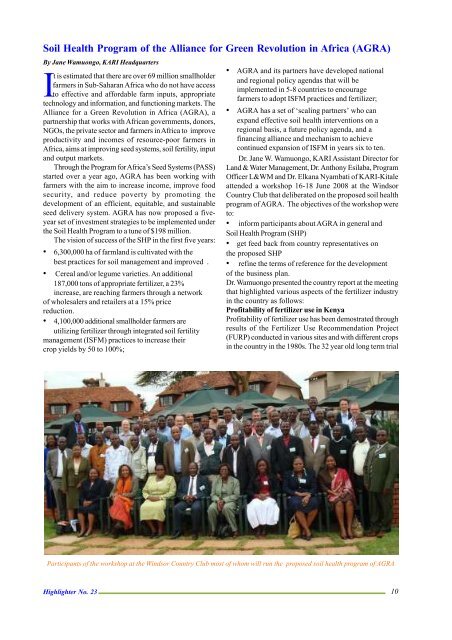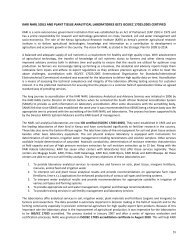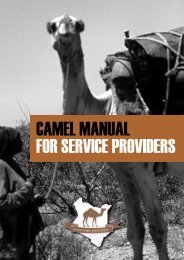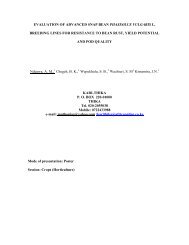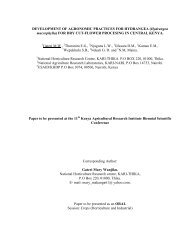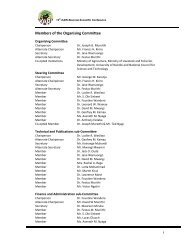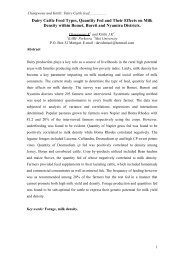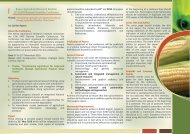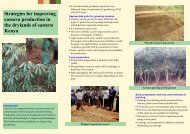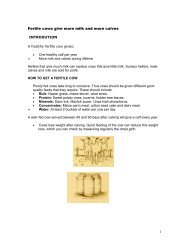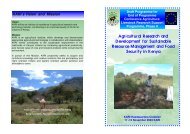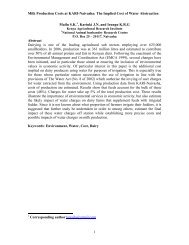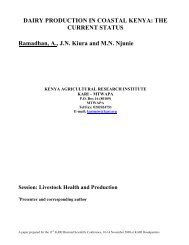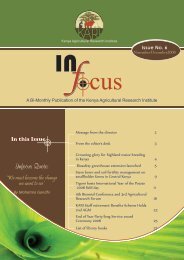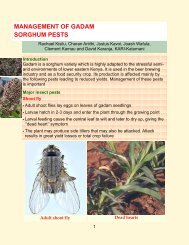January - June 2008 - Kenya Agricultural Research Institute
January - June 2008 - Kenya Agricultural Research Institute
January - June 2008 - Kenya Agricultural Research Institute
Create successful ePaper yourself
Turn your PDF publications into a flip-book with our unique Google optimized e-Paper software.
Soil Health Program of the Alliance for Green Revolution in Africa (AGRA)<br />
By Jane Wamuongo, KARI Headquarters<br />
It is estimated that there are over 69 million smallholder<br />
farmers in Sub-Saharan Africa who do not have access<br />
to effective and affordable farm inputs, appropriate<br />
technology and information, and functioning markets. The<br />
Alliance for a Green Revolution in Africa (AGRA), a<br />
partnership that works with African governments, donors,<br />
NGOs, the private sector and farmers in Africa to improve<br />
productivity and incomes of resource-poor farmers in<br />
Africa, aims at improving seed systems, soil fertility, input<br />
and output markets.<br />
Through the Program for Africa’s Seed Systems (PASS)<br />
started over a year ago, AGRA has been working with<br />
farmers with the aim to increase income, improve food<br />
security, and reduce poverty by promoting the<br />
development of an efficient, equitable, and sustainable<br />
seed delivery system. AGRA has now proposed a fiveyear<br />
set of investment strategies to be implemented under<br />
the Soil Health Program to a tune of $198 million.<br />
The vision of success of the SHP in the first five years:<br />
• 6,300,000 ha of farmland is cultivated with the<br />
best practices for soil management and improved .<br />
• Cereal and/or legume varieties. An additional<br />
187,000 tons of appropriate fertilizer, a 23%<br />
increase, are reaching farmers through a network<br />
of wholesalers and retailers at a 15% price<br />
reduction.<br />
• 4,100,000 additional smallholder farmers are<br />
utilizing fertilizer through integrated soil fertility<br />
management (ISFM) practices to increase their<br />
crop yields by 50 to 100%;<br />
• AGRA and its partners have developed national<br />
and regional policy agendas that will be<br />
implemented in 5-8 countries to encourage<br />
farmers to adopt ISFM practices and fertilizer;<br />
• AGRA has a set of ‘scaling partners’ who can<br />
expand effective soil health interventions on a<br />
regional basis, a future policy agenda, and a<br />
financing alliance and mechanism to achieve<br />
continued expansion of ISFM in years six to ten.<br />
Dr. Jane W. Wamuongo, KARI Assistant Director for<br />
Land & Water Management, Dr. Anthony Esilaba, Program<br />
Officer L&WM and Dr. Elkana Nyambati of KARI-Kitale<br />
attended a workshop 16-18 <strong>June</strong> <strong>2008</strong> at the Windsor<br />
Country Club that deliberated on the proposed soil health<br />
program of AGRA. The objectives of the workshop were<br />
to:<br />
• inform participants about AGRA in general and<br />
Soil Health Program (SHP)<br />
• get feed back from country representatives on<br />
the proposed SHP<br />
• refine the terms of reference for the development<br />
of the business plan.<br />
Dr. Wamuongo presented the country report at the meeting<br />
that highlighted various aspects of the fertilizer industry<br />
in the country as follows:<br />
Profitability of fertilizer use in <strong>Kenya</strong><br />
Profitability of fertilizer use has been demostrated through<br />
results of the Fertilizer Use Recommendation Project<br />
(FURP) conducted in various sites and with different crops<br />
in the country in the 1980s. The 32 year old long term trial<br />
Participants of the workshop at the Windsor Country Club most of whom will run the proposed soil health program of AGRA<br />
Highlighter No. 23<br />
10


